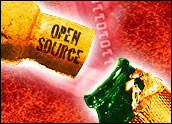
A quiet battle of sorts is taking place behind the scenes in thesoftware industry. Software as a Service (SaaS) and cloud computing haveevolved, placing much more attention on Web-based applications.
This greater focus has also raised expectations for the servicesdelivered via Web 2.0. The open source software community hasresponded to this growing demand for a software-driven Internet bybuilding some of the leading Web apps available.
“I’m seeing more innovation in open source in this area. I’m notseeing closed source developers getting into this. Instead, they arerelying on Microsoft and [other] proprietary developers,” AaronFulkerson, cofounder and CEO of MindTouch, told LinuxInsider.
This technology from open source developers will encourage the next waveof innovation for the Web, he noted.
Witty Wikis
Wikis are major Web 2.0 application, and significant commercial players are joining the scene, according to Fulkerson. His company developed the DekiWiki, an open source, scalable and programmable wiki and applicationplatform. It extends the ability for communities and businesses todeploy enterprise-class custom applications and mashups.
Two schools of thought are developing for Web 2.0 apps, according toFulkerson. Object-oriented design pattern is still being used. Butthis approach does not lend itself well to scaling up and is very costly forWeb 2.0.
“Much of the stuff on the Web is crappily designed. Most of it is doneby code hackers putting together generic modules. This is very low-endstuff,” Fulkerson said.
Instead, Web technology is headed to a distributed environment.Multi-tenant support lets a high number of instances of a singleapplication run from a single server application host, he explained.
A Mixed Bag
Web 2.0 applications cover a wide variety of uses, and open source projects areheavily used in developing these software solutions. Two of thebiggest application types are wikis and blogging systems.
“Open source is becoming integrated with proprietary products. Ourcustomers are both open source and proprietary,” Ilan Sehayek, CTO ofJitterbit, told LinuxInsider. “You can code yourself or use a myriadof products to do the integration.”
Jitterbit is designed to handle complexintegration challenges between legacy, enterprise and on-demandapplications, including business process fusion, ETL (extract, transform and load), SaaS, and SOA (system-oriented architecture). About half of his company’s customers use Linux, while the other half useWindows. His goal is to make Jitterbit an open source platform ofchoice to handle this integration, said Sehayek.
Web 2.0 Killer App?
The search is still on for a definitive killer app for Web 2.0. ButSehayek is still waiting to see what falls out in the Web space.
“In the operating space, Linux is the killer app. In the Web serverspace, Apache is incredibly adopted. Even companies running Windowsstill use Linux servers,” he explained.
But Web 2.0 applications are just starting to come at a higher level, he said.
Web App Rundown
As a testament to the flurry of open source development nestling theWeb, LinuxInsider asked software developers to suggest the hottestopen source apps in use today. Very few respondents sung the sametune.
But we did hear a refrain in some of their responses that suggests ahandful of open source projects worthy of consideration. So thefollowing unranked listing presents a quick rundown on pockets ofstrong interest in the open source Web world.
Polishing the Chrome
One of the newest Web platforms is Google’s Chrome browser. It combines a minimalistic design withtechnology to make it run faster, safer and easier, according to itsdevelopers. The community used components from Apple’s WebKit andMozilla’s Firefox.
The OpenSocial project is a set of common application programming interfaces (APIs) for Web-based social network applications, developed by Google along with MySpace. The platformhelps these sites share their social data with the Web.
Applications using the OpenSocial APIs can be embedded within a socialnetwork or can access a site’s social data from anywhere on the Web.The OpenSocial Foundation is a non-profit corporation created tosustain the free and open development of OpenSocial specifications.
Classic Projects
Old hat does not always mean outdated in the open source world. Somelongstanding projects continue to contribute mightily to the Web’spower. For example, Eclipse and Python continue to form the basis ofmuch of the Web’s underbelly.
Eclipse, originally created by IBM in November 2001, was supported by a consortium of software vendors.Eclipse is a universal tool platform that uses an open extensible integrated development environmentand dozens of plug-ins. Its open source community is focused onbuilding an open development platform comprised of extensibleframeworks, tools and runtimes for building, deploying and managingsoftware across the lifecycle.
A detailed list of the widespread projects the Eclipse communitymaintains is available here.
Python is a dynamic object-oriented programming language adaptable for for many kinds of softwaredevelopment. It supports integration with other languages and toolsand comes with extensive standard libraries.
Python runs on Windows, Linux/Unix, Mac OS X, OS/2, Amiga, Palmhandhelds and Nokia mobile phones. Python has also been ported to theJava and .Net virtual machines.
Getting the Word Out
Online publishing has become a new world unto itself. Gone are thedays when wordsmiths had to create documents in a word processor andconvert it to HTML formatting for uploading to a Web site. One of themost visible open source responses to Web 2.0 growth has been in the realm ofonline communication.
For instance, Chyrp is a lightweight, open source blogging application modeled after Tumblr. Its engine is lightweight yet very functional.
Chyrp is driven by PHP and MySQL plus some Ajax for good measure. Itstheme is highly personalizable. Its structure is loosely based on theModel-View Controller (MVC) design pattern.
Tumblelogs, an earlier open source project from Tumblr.com is avery popular publishing platform. Users can share text, photos,quotes, links, music and videos from their browser, phone, desktop ore-mail.
The program is very customizable. Users can tweak most displayelements, from colors to the theme’s HTML markup. The program alsoallows use of the user’s own domain name.
More Words to Go
Two programs that provide a more focused tool for the blogosphere areTextpatter and WordPress.
Textpattern is a popular platform for blogging. It uses Textile, a simple syntax for enhancing plain text into structurally sound and stylistically rich web content.
The latest version (4.07) includes some sophisticated features.For example, WYSIWYG provides a real-time preview for all articles,even those in draft or hidden state. Another new feature is an XML-RPCserver, which replaces the separate download needed previously.
A cool feature lets authors tag their articles with an optionalexpiration timestamp. This gives writers the option to let their workdisappear from the public site completely or transform the work’sappearance. Also, the communication channel to the database server canemploy optional SSL (secure sockets layer) encryption.
Perhaps one of the most popular entries in this space is WordPress. It is a state-of-the-art publishing platform with a focus on aesthetics, Web standards and usability.
The newest version, 2.7 Coltrane, has a new interface and speedierperformance. When it first appears in 2003, WordPress simply enhancedthe typography of everyday writing. Today it is used on countlessthousands of sites. It is built on PHP and MySQL.
Solution for the Social Minded
Open source software has the power to feed the social networkingfrenzy. Two contenders in this space are Elgg and MediaWiki
Elgg is a relative newcomer to social networkingplatforms in its 1.0 release in 2004. The platform makes it easy forusers to create their own social network. Its flexible socialnetworking engine is designed to run at the core of any socially-awareapplication.
Elgg runs on Apache, PHP and MySQL. This makes it a good fit for Web2.0, as these are the same open source platforms in which most Webapplications are written. Elgg is compatible with enterprisetechnologies like the Zend Platform and any server environment thatcan run the Apache Web server. It also supports OpenDD, OpenID andOpenSocial.
MediaWiki is the wiki software that was originally developed for Wikipedia. It is designedto run on a large server farm for a Web site with daily hits in themillions. It uses PHP to process and display data stored in its MySQLdatabase. Pages are rendered in MediaWiki’s wikitext format so userscan edit without knowledge of XHTML or cascading style sheets (CSS).
Pre-edited pages are saved in the database for easy reversals.MediaWiki manages both image and multimedia files and supports cachingand Squid proxy server software.






















































Great Story. I just commented on one of the story on this site about my selection of cyn.in (http://cyn.in) over socialtext and rest of the wiki+social+enterprise collaboration software. Next is this post. This post gave me confidence that I have selected a right product for my collaboration requirement. cyn.in is an open source group collaboration software comprises of wiki, blog, shared work spaces, file repository, calender, micro-blogging among the users, version control system. Built on on top of Python powered Plone CMS, cyn.in runs on Linux, Mac and Windows, they say that cyn.in appliance has inbuilt OS. I hope to witness wonders 🙂
Hi All,
I’m "Linux enthusiast" since Novell bought SuSE.
I’ve run web sites, Blogs, and servers. It is simply a hobby.
Web 2.0 will only mean something for me when I can run personaly, my Linux set-up to serve millions.
Think about is for a minute. Server, applications, codecs, OS. That would be software as a source of income.